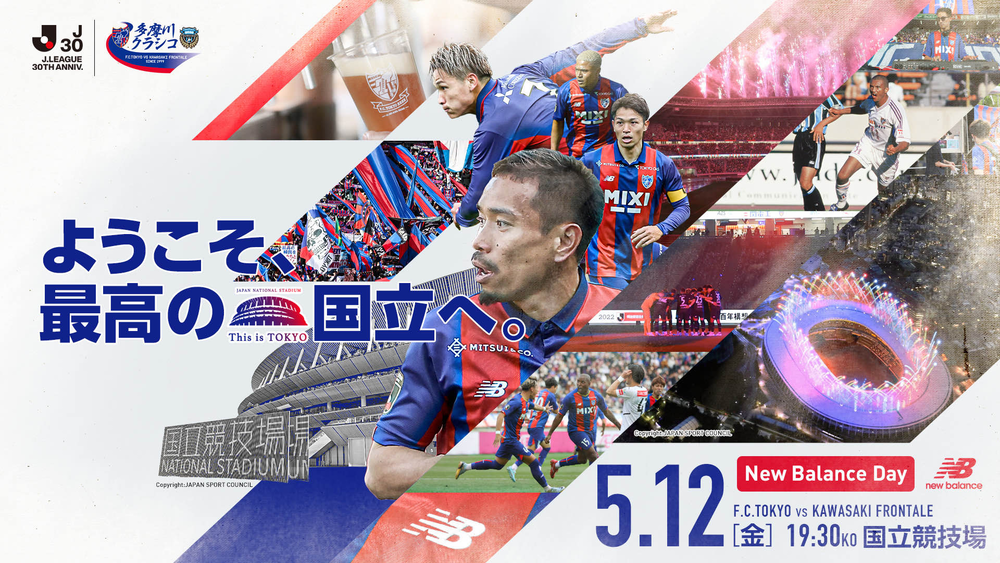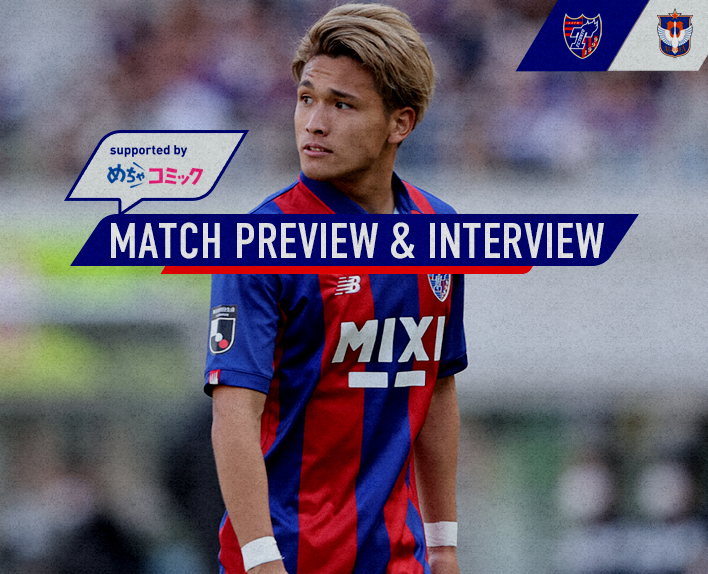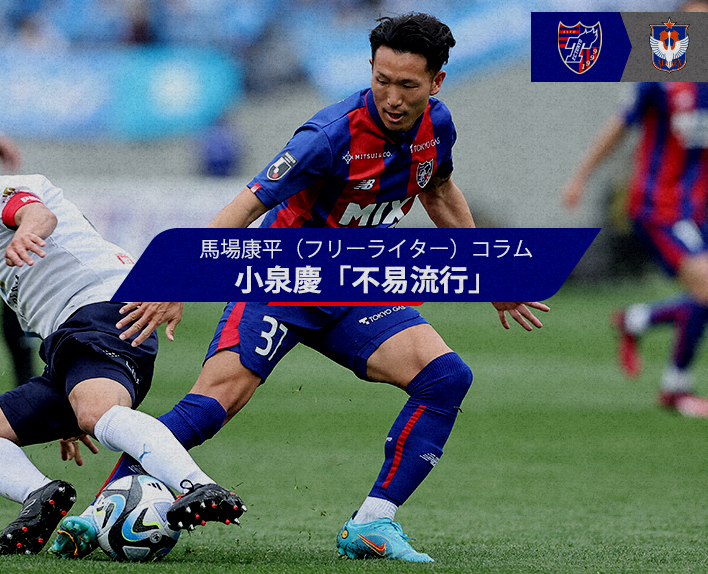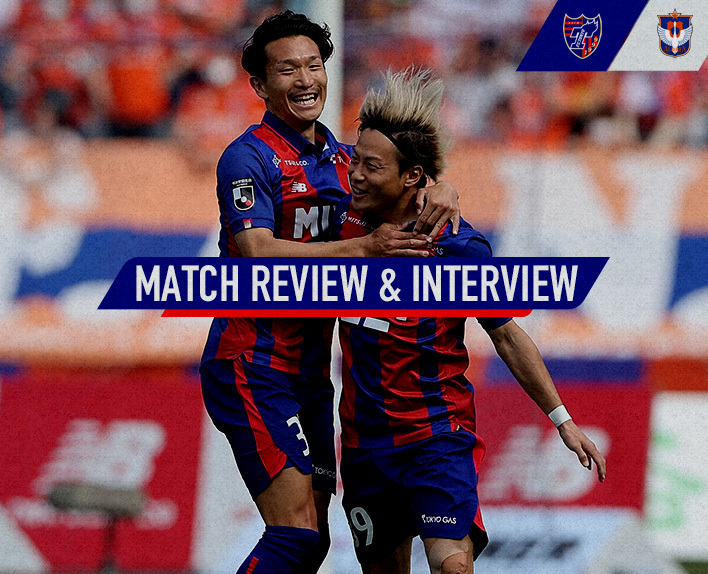<Previous Match - Sanfrecce HiroshimaMatch Review>
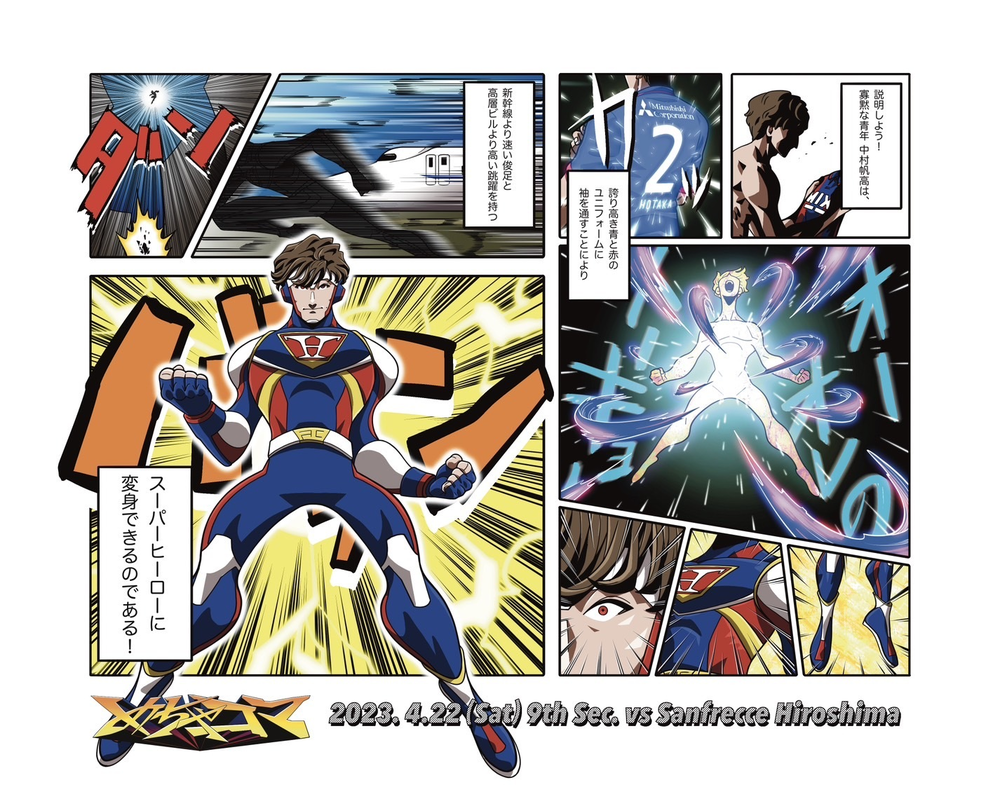
The hero appeared gracefully from the far side, the outermost edge.
This season, Tokyo, which had not won away, was keenly aiming for victory in Hiroshima. After winning against Gamba Osaka in the Levain Cup three days ago, they broke the unpleasant streak of not winning in April and confidently headed to Hiroshima.
At that time, it arrived immediately.
In the 5th minute of the first half, a free kick opportunity was gained in a shallow position on the left side of the opponent's half, and Kuryu MATSUKI delivered a sharp cross into the goal area. As Diego OLIVEIRA jumped into the center, the opposing players were drawn in, and number 2, who had been in the blind spot of the opposing defender on the far side, surged in and headed the ball into the goal.
The hero who ran to the goal area and let out a roar will accomplish even greater feats.
In the 28th minute of the first half, while the team was enduring a period of time with the opponent holding the ball in their own territory, Tokyo had a chance. After a long time, they created a scene where they advanced the ball deep into the opponent's area, and number 2 broke free from a through pass by Diego TABA. Calmly assessing the position of the hurried defender returning to the goal, Hotaka NAKAMURA sent a pass backward, setting up a goal for his fellow Meiji University graduate, Shuto ABE.
Although we conceded a goal in the first half, we held on firmly during the second half and maintained our one-goal lead, achieving our first victory in the league after five matches.
The key player was undoubtedly the fighter-type hero entrusted with the right side, who responded to the cheers of the fans and supporters.
Preview
In the previous match, we achieved victory away against Sanfrecce Hiroshima, who were on a five-game winning streak, marking our first win in the league in five matches. While we felt relieved to secure a win after about a month, the players expressed their reflections after the match. In particular, the content of the second half, where we struggled to maintain possession and were on the defensive, was not satisfactory.
Kei KOIZUMI said, "There were voices saying that this match performance was not good. However, winning and correcting our issues is the most important. Personally, I want to touch the ball a bit more to help calm the team down." To achieve results in the three consecutive matches starting this round, the team's ability to make adjustments will be tested.
The first opponent in the three consecutive matches is Albirex Niigata. Coach Albert PUIG ORTONEDA led the team until two seasons ago, and Coach Rikizo MATSUHASHI, who succeeded him last season, has further evolved the team. This season, which marks a return to J1 after six seasons, showcases a high level of mature football. After Sec. 9, they have earned 12 points, the same as Tokyo.
Coach Albert PUIG ORTONEDA expressed his feelings for his former club, saying, "I have affection for Niigata," and added, "I wish for Niigata's good fortune except when facing Tokyo." Of course, the victory at Ajinomoto will be for Tokyo.
[Interview with Coach Albert PUIG ORTONEDA]
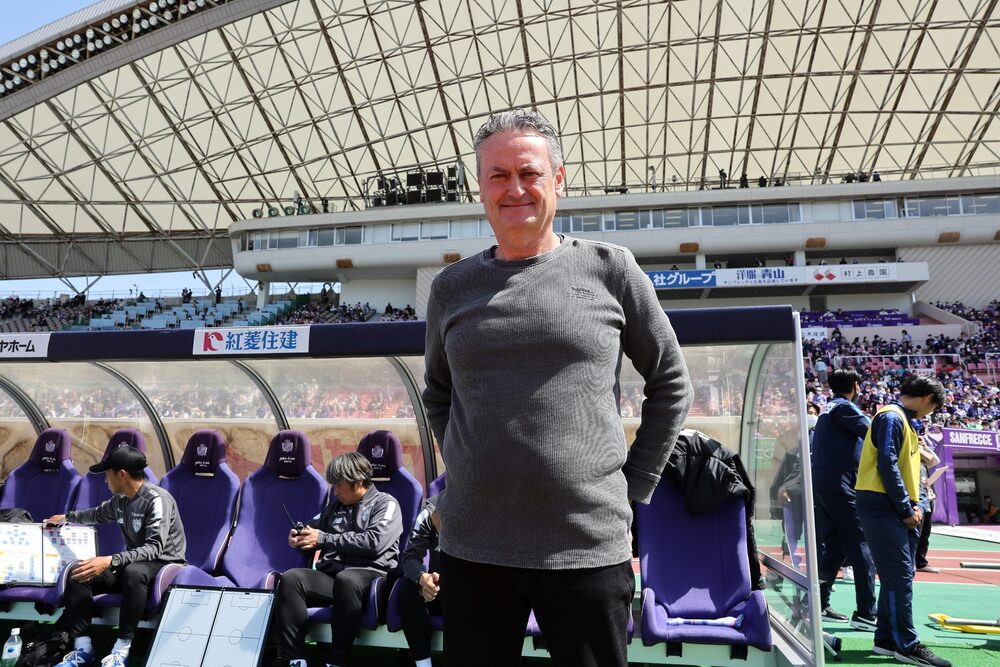
Q: How do you perceive the momentum of consecutive wins in official matches?
I feel that we are regaining the good flow and feeling that we had from the preseason to the opening match. This season, we are focusing on firmly pursuing victories, accumulating points, and establishing our team style. In the first half against Sanfrecce Hiroshima, we expressed good play. Both in offense and defense, we maintained a calm approach with a balance of pace. In the second half, we were able to solidify our defense, but I think we need to improve because we had less time with the ball. However, the attitude of pursuing victory was evident in our play, so we can also interpret that we had a good match in the second half.
Q, please tell me what is necessary to continue this good feeling and flow.
First, it is important not to have any injuries. Continuing high-quality training is the only thing necessary for daily growth.
Q: Please share your thoughts as you prepare for the match against Niigata.
During my two seasons in Niigata, I was able to live in a good environment and had a great time. When I started leading in Niigata, there were times when things didn't go well, but I would like to express my gratitude once again to all the Niigata supporters who supported me. Four seasons have passed since then. I am truly happy to see that the club and team's style has become clearer and is beginning to be established.
Q: We have to face Niigata, a team we have strong feelings for, in this match.
Whether it's against Niigata or FC Barcelona, I am determined to win. That's only natural. I have affection for both clubs, but of course, I want to win the match. Aside from this weekend's game, I wish them luck, but for this match, I want to focus on winning.
Q. Do you feel any changes since Coach Albert PUIG ORTONEDA was in charge?
I believe that the base of our style has not changed since I was in charge. In my second season managing in Niigata, there were many instances where the opposing teams lowered their defensive positions and set up blocks, and we were unable to break through that. However, after Rikizo MATSUHASHI took over as coach, it seems that this aspect has improved. I also think that the reinforcements suitable for Niigata's style, including Ryotaro ITO, have brought an added value to the team. Additionally, young players like Shunsuke MITO and Yota KOMI, who debuted during my time as coach, have gained experience and are now playing as key players for the team. Their growth has also contributed a lot to the team. It has been about four seasons since I was with the team, fighting based on the same style, and I feel that the maturity has increased. I believe that various elements have blended well together, leading to last season's J2 championship.
The important thing is to progress in order towards success. I believe that continuing to compete on the J1 stage with consistency brings them a good flow. The two seasons I was part of were honestly difficult times, but if that struggle has led to their success, I would be happy. I think the same can be said for Tokyo. There are not only joyful times but also challenging periods. However, if that period leads to the future, I would be happy.
Q: What are the important points in a match between teams with similar styles?
I feel that the styles are not that similar. Many of the players from Niigata value play at their feet and are good at connecting the ball. On the other hand, the style we are currently working on is built around the characteristics of our existing players, so I believe there will be differences between the two styles.
Q: Please tell us what is important for Tokyo to win this match.
First, it is important to firmly express our style. The aggressiveness in the midfield, the movements to break into space, and further developing the play we showed in the first half against Hiroshima is crucial. I believe we just need to sharpen our weapons for this match and approach it with that mindset.
Q: Is the strong midfield defense likely to be a key point?
Yes, of course it's important. Not just in this match, but midfield defense is crucial in any game. The best plays come when you can quickly switch from good defense to building an attack. I believe that the current Niigata team is capable of expressing quick transitions between offense and defense. During my time in Niigata, we faced Verdy and won 7-0. In that match as well, many goals were scored from quick transitions. I think it's their great weapon.
Q: I think there are many players in Tokyo with strong defensive abilities. After the second half of the match against Hiroshima, was the fact that you were able to defend solidly with a five-back formation while leading a source of confidence for you?
A, J1 is a very competitive league. Therefore, the first goal has a significant impact on the flow of the match. It is possible to win a game even with a possession rate of 30 percent. Scoring the first goal early can lead to a more defensive approach. The same can be said for the recent match against Hiroshima. If we had conceded the first goal, we would have controlled the match more aggressively, and our possession rate would have increased. The opponent was substituting forwards and aiming for an equalizer and a turnaround at a fast pace, but I believe we were able to respond well to their direct play. Against an aggressive opponent, including our bench members, we were able to finish the match solidly. Now that the injured players have returned, I believe we proved in the last match that we can compete on equal terms with the top teams.
Q: What kind of person is Coach Matsuhashi in the eyes of Coach Albert PUIG ORTONEDA?
A wonderful person who dedicates everything to soccer. During our time in Niigata, we worked together in a relationship of coach and head coach, respecting each other and being able to work in a great relationship. I have many good memories with him. Having such a wonderful person as the coach leading Niigata is likely the secret to Niigata's success.
[Player Interview]
<Kuryu MATSUKI>
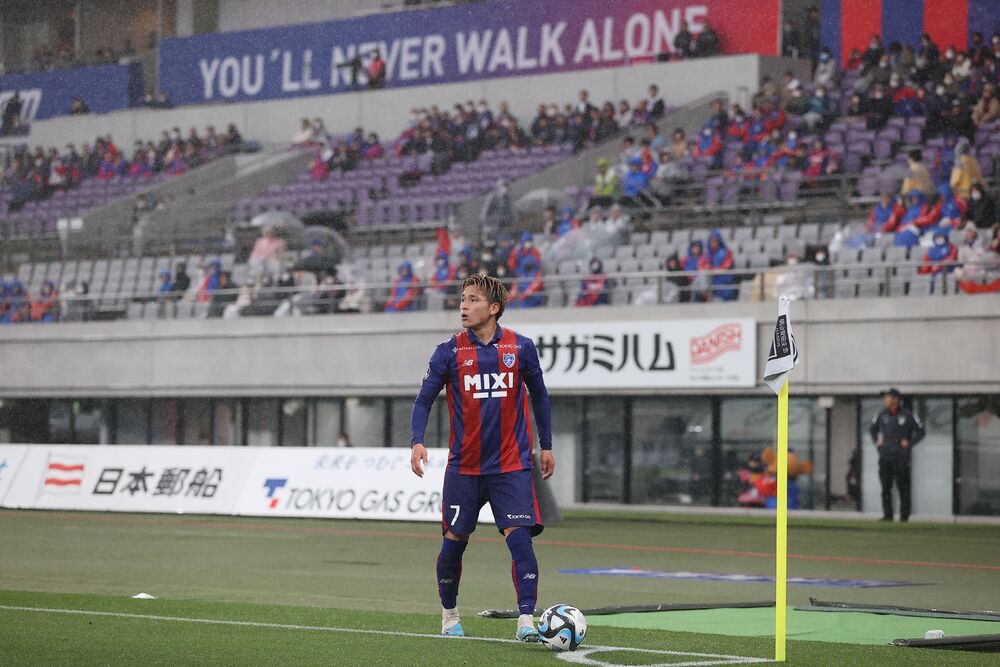
Q: This week's match against Albirex Niigata will be your last game as a teenager. What kind of match do you want it to be?
A, nothing changes in what we need to do. First, we want to continue the momentum from our victory against Sanfrecce Hiroshima and refine our style of football.
Q: Is there anything you are conscious of from the perspective of your last match in your teens?
A, there is nothing in particular, but I have a strong desire to score a goal.
Q: There were times when we were dominated by Hiroshima, but we managed to win. Were you able to train in a positive atmosphere this week?
A, the match must be won; otherwise, it has no meaning. Seeking victory in any form is an absolute condition, and I want to play with our focus directed towards ourselves in tomorrow's match.
Q: How do you manage risks when the press is bypassed, as seen in the goals conceded against Hiroshima?
A, defending from the front line carries risks, and there may be situations where we end up with an equal or disadvantageous number of players when we switch places with the opposing players. If each player responds properly, I believe we can prevent easy goals. I want to stay focused and approach tomorrow's match with determination.
Q: I think that Kei KOIZUMI and Matsuki, who play as defensive midfielders, are players with great running ability. Is there an intention to cover the spaces that open up during defense?
Tokyo has a level of physical activity that other teams do not possess. I want to make sure we stand out in that aspect.
Q: What do you keep in mind when aiming to score?
A, I always aim to score in every match, but I want to improve the quality of my shots and increase the number of times I get in front of the goal. It's definitely not about ego; I want to increase the number of times I contribute to scoring through play that is well-suited to the team's situation.
Q: How much is the awareness of putting more players in front of the goal shared within the team?
A, many of the goals scored in the matches so far have come from short counters or set plays. Currently, there are few players entering the goal area when we break through the pocket, so I believe we need to increase the number of times midfield players show up in that position.
Q: If you are in the position of a defensive midfielder, I think the option for a final pass will also come up.
By increasing the number of players in front of the goal, the chances of scoring also increase. I believe that the defensive midfielders need to actively get involved and seek opportunities.
Q: I believe you are not satisfied with the match content, but does firmly defending like in the previous match against Hiroshima lead to confidence in achieving victory?
A, the ideal scenario is to fight for 90 minutes with the current team style, but I believe that by being focused on victory, such scenes will increase to some extent. I want to show a commitment to victory by maintaining solid communication, including with the coach, during the match.
Q, please tell us your impression of Niigata.
It seems that they have many players with high technical skills at their feet, and they use short counters as their weapon.
Q: How do you perceive turning 20?
I believe that the evaluation criteria in football change between the teens and twenties. I want to achieve results in the Niigata match, which will be my last game as a teenager, and grow into a player who can make an even greater impact in my twenties.
<Shuto ABE>
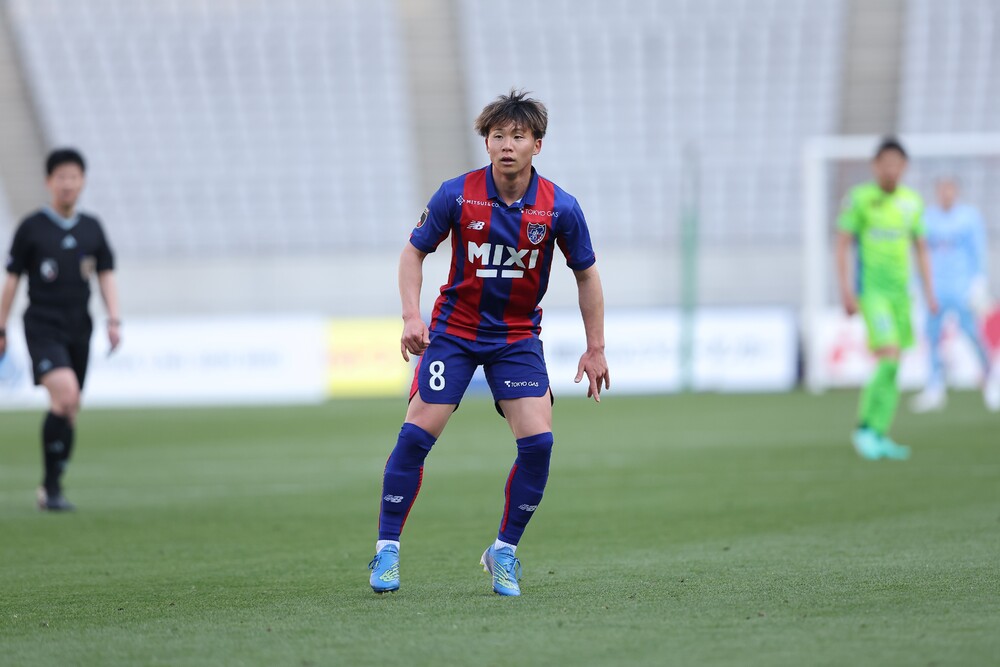
Q: You have played three matches since returning from injury. How is your current condition?
A, there is no problem at all with the injured area, but I still feel that my condition has not fully improved. I have the feeling that I can do more, so I want to gradually improve my condition.
Q: Will it still not be at 100 percent after 2 or 3 weeks of returning?
Yes, that's right. I am playing with the feeling that my sharpness from before has not yet returned.
Q: Please reflect on the goal scene in the match against Sanfrecce Hiroshima. Is it a goal you are satisfied with yourself?
A, when Diego OLIVEIRA passed the ball to Hotaka NAKAMURA, I was running to the near post, so I hesitated whether to ask for the pass in that flow. However, since there was a Hiroshima player in front of me, I thought it wouldn't get through, so I stopped my movement for a moment. At that timing, NAKAMURA was just watching. A good pass came, so I focused on not missing and kicked it into the goal.
Q: It was a goal in a situation where we wanted another point in the flow of the match. Wasn't it a goal that says, 'I did it'?
In the first half, Tokyo had relatively many good scenes, and we were able to score the opening goal early on. Hiroshima also created some chances, but we defended well and it was significant that we were able to score an additional goal. I think we scored the additional goal at a good timing as well.
Q: Changing the subject a bit, Nakamura has been in great form this season and seems to have taken his game to the next level. What is your impression of him from the perspective of your peer, Abe?
A, you are still playing with high intensity in defense. In terms of offense, the coach told you to "stay calm," and I think that calmness is starting to show. I feel that your crossing accuracy and composure in play have improved, and the pass you made to me in the Hiroshima match showed that you were well aware of the opponent. I feel you are growing.
Q: In the match against Hiroshima, we took a good lead by scoring two goals, but then we conceded a goal, and in the second half, we had to endure some tough moments. However, it felt like we managed to close out the game with determination to win. It was a good game with a strong sense of commitment to victory, wasn't it?
A, we had been far from victory in the league matches. We were leading, and as we entered the second half, I thought we absolutely had to defend our lead. Among the players, there were voices saying, 'Let's go for an additional goal,' but we couldn't create that kind of development, and it turned into a situation where we had to set up a block. Hiroshima's attacks were of high quality, but centered around Masato MORISHIGE, we were able to defend by putting our bodies on the line in front of the goal, and although we were shaken a few times by side changes, there were no scenes where we were cut through by sharp vertical passes. We were able to play with the understanding that it was inevitable to be shifted to the sides while concentrating on tightening our central position, and since everyone was fully committed, I believe it was a victory that leads to the next step.
Q: During the time you were sidelined due to injury, there were periods when the results were unstable. How did you view the team from the outside?
For about a month, watching the team from outside the pitch was frustrating, and I felt sorry that I couldn't help during a time when the team wasn't getting results and couldn't win. I was thinking, "If I were on the pitch, I would play like this," while watching the matches.
Q: Do you feel that the challenges you observed from the outside are being addressed in your current preparations?
A, challenges arise in every match, so I want to play while improving day by day. Gradually, players have returned, and I would like to align more. Regarding communication, I believe we are getting into a good shape, including this week's practice.
Q: During the time when key players, including Abe, were unavailable due to injuries or national team duties, there were also contributions from young players and academy players. I believe there were positive aspects for the team as well.
I believe that if young players do not continue to emerge and compete for positions, the team will not progress further, and without competition, individuals cannot grow. In that sense, there are many excellent young players. Among the many players who show potential for the future, I hope they will do more, and I look forward to seeing more of them emerge.
Q: Abe joined the team just as the COVID-19 pandemic began, but this season we can finally have fans cheering in a full stadium. It feels like the atmosphere at Ajinomoto Stadium has finally returned. What is your impression of this, Abe?
When fans and supporters cheer for us, the players' motivation increases significantly. Especially the excitement in the last 15 minutes of the second half, the energetic vibe you create is greatly appreciated. It feels like the atmosphere for scoring rises, and I truly believe that soccer is a sport that exists because of the fans and supporters. We are grateful for your support.
Q: Finally, please share your enthusiasm for the match against Albirex Niigata.
In the first match of the three consecutive games, since it is at Ajinomoto and we won the last match, I want to carry that momentum and aim for three victories in a row. First, I want to secure a win at Ajinomoto and then approach the two away matches. Thank you for your passionate support.
